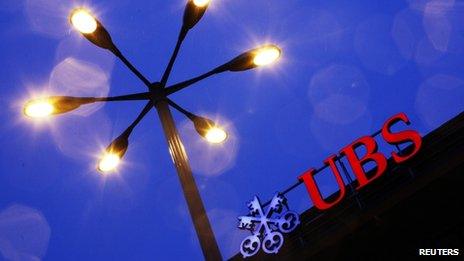UBS: How big will the Libor bill be?
- Published
- comments

Even by the standards of recent revelations of wrongdoing at the world's biggest banks, the disclosures of how UBS tried to systematically manipulate the important Libor interest rate benchmarks will be seen as pretty hair-raising.
UBS has been punished by regulators in the US, UK and its home country of Switzerland. The Financial Services Authority (FSA) investigation catalogued at least 2,000 documented requests for inappropriate Libor submissions and countless verbal ones. The British regulator describes the misconduct as "extensive and widespread" and says at least 45 UBS bankers knew what was going on.
The fines and disgorgements of profits imposed on UBS, of £940m, is more than three times what Barclays paid earlier this year - when it became the first bank to settle the Libor cases against it. UBS's UK fine of £160m is the largest ever imposed by the FSA, even after a 20% discount for early settlement.
What may be most significant in UBS's case is that Swiss regulators at FINMA have proved that it profited from the market manipulation - which increases the risk that it may be forced to pay damages in civil litigation to customers on the wrong end of rigged interest rates.
The point is that when Barclays was punished, regulators were unable to demonstrate that it had actually made a profit from Libor rigging.
BBC's Robert Peston explains UBS Libor fine
Here is what will therefore trouble many banks: with Libor the benchmark for more than $300 trillion of financial products, the potential costs to them could be eye-watering if clients can prove they are out of pocket as a result of market rigging; and the UBS settlement will be seen by actual and potential claimants as strengthening their cause.
As I mentioned the other day, banks' sins during the boom years are costing them - and us - very dear, in fines and restitution to clients. The financial cost of atonement threatens to seriously deplete their capital and undermine their ability to create the credit essential for economic recovery.
The most serious misconduct by UBS appears to have been in yen interest rates. UBS Securities Japan has agreed to enter a plea with the US Department of Justice of one count of wire fraud relating to the manipulation of a number of benchmark interest rates, including Yen Libor.
The FSA says the manipulation went on between 2005 and 2010. It was, says the FSA, "discussed in internal open chat forums and group emails, and was widely known".
That open flouting of the rules raises the embarrassing question for regulatory bodies, including the FSA, of why the wrongdoing wasn't detected much earlier.
And there is also an important question for UBS, which is why so much bad stuff has happened at this bank in recent years - including massive losses on toxic debt during the crash of 2008, the £1.4bn loss from a trading fraud by Kweku Adoboli, a £500m settlement of a tax evasion probe in the US, and costs of claims related to sales of residential mortgage-backed securities.
There is the financial cost of all this: UBS announced this morning it would make losses in the fourth quarter of this year. But perhaps more importantly, there is the huge reputational damage for a bank that used to be seen as a rock of probity and stability.
That said, other banks cannot revel in UBS's discomfiture, given that most of them have been tainted by the scandal of their mis-selling and misbehaviour in the boom years.
Next up for humiliation and punishment for Libor wrongdoing, early in the new year, is expected to be the UK's semi-nationalised Royal Bank of Scotland. Fines and penalties imposed on it are likely to be rather more than Barclays' £290m, though less than what UBS is paying.